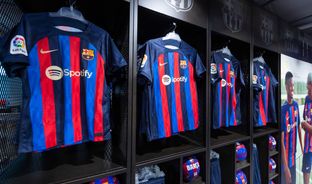The lowdown on Rayo Vallecano
- label.aria.viber Viber
- label.aria.whatsapp WhatsApp
- label.aria.twitter Twitter
- label.aria.facebook Facebook
- label.aria.messenger Messenger
- label.aria.link label.aria.tick Copy link
On Wednesday at 7.00pm CEST, FC Barcelona are off to Rayo Vallecano in search of their first away win of the season. Let’s take a closer look at the team with the iconic red sash.
History
Hailing from Madrid’s typically working class neighbourhood of Vallecas, the name ‘Rayo’ means ‘stripe’ and refers to the club’s distinctive red diagonal on their shirt, which allegedly honours the colours of Argentinian club River Plate.
The club was founded in 1924, and is typically regarded as the ‘third team’ in the Spanish capital, although that mantle has been challenged in recent years by Getafe and Leganés.
Rayo didn’t play La Liga football until 1977. Since then, they have come to be regarded as the archetypical ‘elevator’ team of Spanish football, being relegated eight times but always eventually bouncing back up (which is actually well short of the record of 12 relegations shared by Malaga and Deportivo).
Rayo’s most recent relegation was in 2019, but two years later they won the second division and are back for another shot at the top level.
The stadium
Opened in 1976 on the site of an older ground, what is officially known as the Campo de Fútbol de Vallecas only holds 14,708 spectators but is famed for its intimidating atmosphere and particularly its passionate Bukaneros supporters group.
For many years the ground was named after Teresa Rivero, Spanish football’s first female president, and among other claims to fame, it was here that Queen performed what would be the third-to-last ever concert with Freddie Mercury.

It was at Vallecas that Claudio Bravo set a new league record in 2014 for going 560 minutes without conceding a goal from the start of a Liga season, which he would eventually extend to 754 minutes.
Head to head
Games between the sides have typically meant goals, and usually for Barça, including 7-0, 6-0 and 6-1 wins in recent years. In fact, in 39 meetings, there has only ever been one 0-0 draw.
In all competitions, Barça are on an incredible run of 14 straight wins against Rayo, and one more would set a club record against the same team (currently tied with the 14 defeats of Valladolid between 1990 and 1996).
The last meeting was in the last 16 of the Copa del Rey last season, when Rayo (still in the second division at the time) took the lead through Fran García. Late goals from Leo Messi and Frenkie De Jong avoided a major cupset.
Form guide
Rayo have made home advantage count in every game at Vallecas this season, and are in fact one of just six teams (Dortmund, PSG, Napoli, AC Milan and Sevilla are the others) with a one hundred per cent home record in Europe’s big five leagues.
Things have proved harder on the road, where they have only collected four of a possible 15 points, but as things stand they are an impressive seventh in the table, with one point more than Barça albeit having played extra game.
The players
International caps
Radamel Falcao (Colombia, 97); Stole Dimitrievski (North Macedonia, 50); Esteban Saveljich (Montenegro, 4); Mario Suárez (Spain, 3); Kévin Rodrigues (Portugal, 3); Iván Balliu (Albania, 2)
Top goalscorers 2021/22
Álvaro García (4), Randy Nyeka (3), Radamel Falcao (3), Óscar Trejo (2)
Barça connections
Ivan Balliu (pictured below, left) grew up at La Masia and made his Barça B debut in 2010/11 under Luis Enrique, and later played for two more years under Eusebio Sacristán before leaving for Arouca in Portugal. The right back also played for Metz in France and Almeria before joining Rayo last summer. Although he played for Spain at youth level, he qualifies to play for Albania through his father and has won two senior caps for the country.

The manager
Andoni Iraola was a stalwart in the Athletic Club defence for many years, and played seven times for Spain. His first coaching role at AEK Narnaca in Cyprus was anything but a success (he didn’t win a single game), but he made a big name for himself when he guided second division Mirandés to the Copa del Rey semi-finals in 2020.
In August 2020, he replaced Paco Jémez at Rayo and guided them back into the top flight.
- label.aria.viber Viber
- label.aria.whatsapp WhatsApp
- label.aria.twitter Twitter
- label.aria.facebook Facebook
- label.aria.messenger Messenger
- label.aria.link label.aria.tick Copy link
